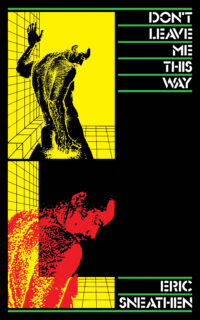You Say to the Boy Open
Your Eyes
Wind. Weather. Of the
deep rigging. Repeatedly
How frail our ship our
waves. There. Thread
Of sails on the lips. Held
steady. I rub my eyes.
Love ahead. The bad
weather. So they did. There
They poured libations to
the passing of a shadow.
Salt lips touching. Marbled
fingers. Nights of oars
And weather. The score of
wing beats. Kiss me
Repeatedly dusk. The smell
of him. The crew and
Horrible wind. Sun. So
our ship smashed into bits.
Purple waves. The quick
black ship is everlastingly.
There. Love. Clouds waded
boldly out into day.
We fall. Was splashing
tossed companions. Sun
Scattered stubble. Little
ship. Love’s gleaming sky.
I place a delphinium till
dawn the ship sailed on.
I am deeply pleased to see a new poetry title by Oakland, California “poet and queer literary historian” Eric Sneathen, following his full-length debut, Snail Poems (Krupskaya, 2016) [see my review of such here], the lyricly-beautiful and deeply powerful newly-released Don’t Leave Me This Way (New York NY: Nightboat Books, 2023). As the back cover offers: “Don’t Leave Me This Way blends archival research with sexual fantasy to produce a series of sonnets inspired by Gaétan Dugas, named by Randy Shilts as ‘Patient Zero’ of the AIDS epidemic in North America. Committed to the utopian possibilities of elegy and pornography, Don’t Leave Me This Way exploits the absurdist beauty of the cut-up technique to voice a chorus of lost spirits: poignant, vengeful, and ready to ball.”
There is something of Sneathen’s lyric narratives through prose poems that hold an echo of some of the “new narrative” writings of the Bay Area in the 1970s, as showcased in the anthology Writers Who Love Too Much: New Narrative 1977-1997, eds. Dodie Bellamy and Kevin Killian (New York NY: Nightboat Books, 2017) [see my review of such here], such as the late Steve Abbott (1943-1992), acknowledged through the hefty collection Beautiful Aliens: A Steve Abbott Reader, edited by Jamie Townsend with an afterword by Alysia Abbott (New York NY: Nightboat Books, 2019) [see my review of such here] for their shared blend of first-person narrative, wild energy and lyric experimentation, simultaneous sense of joy and impending doom, queer content and the AIDS crisis, and for their use of deeply person biographical material. “Gaétan’s perfect finger draws this cluster,” Sneathen writes, to open the poem “Gaétan’s Perfect Finger Draws this Cluster,” “Of gasoline azaleas. Remember that each / One represents with choppy surfaces, men / Bent in upon his inviting smile.” The facts of the story are intertwined with the lyric, and the facts are important, even when offered slant, or cloudy, or glossy. “Since being cast as ‘Patient Zero,’” Sneathen writes, as part of a length afterword to the collection, “Gaétan Dugas has persisted between and among texts, in an array of representations and fantasies. I wrote this book in order to listen to those fantasies. I wanted to hear the clamor of a phantasmic bacchanal echoing in the corridor of an ongoing emergency. Clad in tight jeans and a flannel shirt, it is a fantasy that cruises me under the dim lights of the recent past. I perceive something of its winning smile beaming beneath its full mustache.”



No comments:
Post a Comment